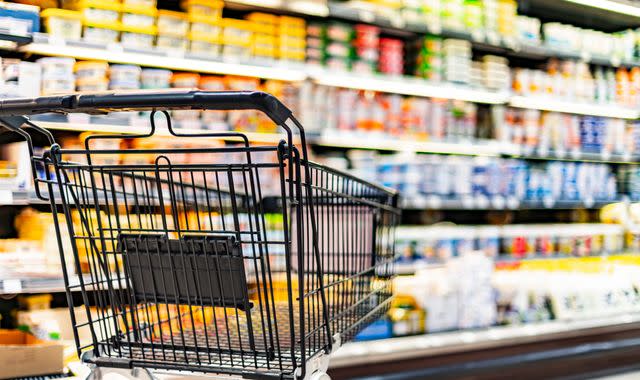Cost of living: Grocery price inflation at 'lowest level in more than a year'

The pace of grocery price inflation has eased to its lowest level in more than a year, according to closely watched industry data.
Kantar Worldpanel said costs for customers at the tills were 12.2% higher than a year ago over the four weeks to 3 September.
That was down from the 12.7% recorded in the previous month and represented the sixth consecutive decline since the 17.5% peak witnessed in March.
Even at the lower level, it remains well above pay awards - maintaining the squeeze on household budgets amid the evolving cost of living crisis.
Earlier on Tuesday, the Office for National Statistics revealed that basic wage growth was running at 7.8% in July.
That fact was reflected in wider research by Kantar that showed continued deep concern among shoppers about the prices they were being asked to pay at the checkout.
Fraser McKevitt, its head of retail and consumer insight, said: "Grocery price inflation is down for the sixth month in a row, but 12.2% won't be a number to celebrate for many households.
"Our data shows that 95% of consumers are still worried about the impact of rising grocery prices, matched only by their concern about energy bills.
"After a full year of double-digit grocery inflation, it's no surprise that just under a quarter of the population consider themselves to be struggling financially - although this is a very slight drop compared to May."
The report showed that supermarket own-label sales grew by 9.9% over the month, with the products now making up 51% of all grocery sales.
Discounters Aldi and Lidl continued to benefit from the shift, Kantar said, with almost 18% of the grocery market between them.
Kantar also noted shoppers had been making the most of Wilko's closing sales, with its share of non-food groceries - such as toiletries and household goods - rising from 1.8% in July to 2.3% in August.
The report said there was no change in the top three products - placing upward pressure on grocery price inflation.
Prices were rising fastest in markets such as eggs, sugar confectionery and frozen potato products.
The next set of official inflation figures, covering August, are due to be released next week.
Economists, and the chancellor, believe there could be a small rise in the consumer price index (CPI) measure from 6.8% due to rising global oil prices.
While that is expected to place additional pressure on the government's target to halve inflation this year, experts believe a wider easing in the cost of the basket of goods and services used to measure CPI will continue to be reflected in the data in the months ahead.

 Yahoo News
Yahoo News 
